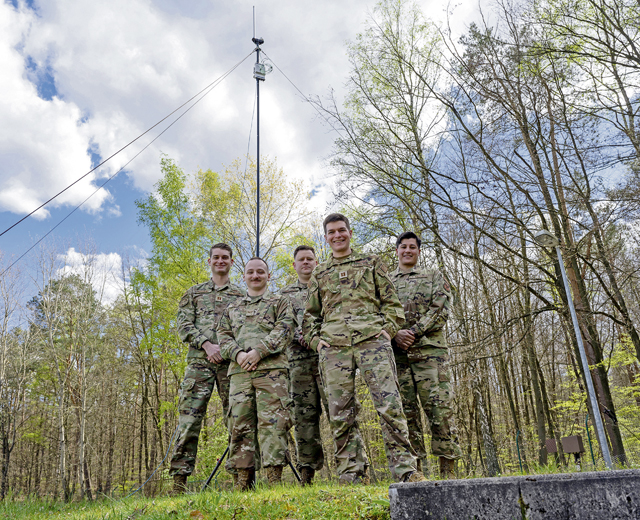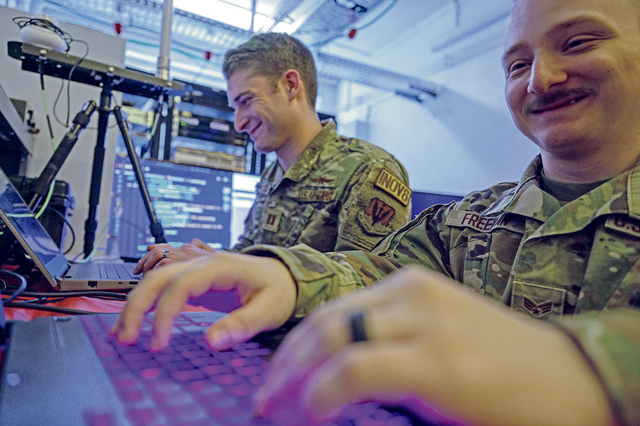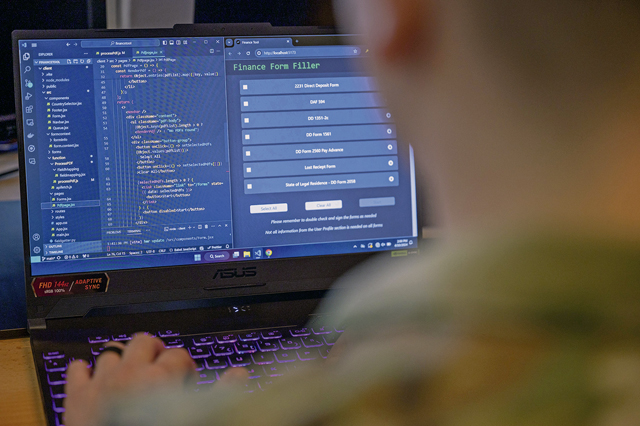
U.S. Air Force and Space Force professionals need agile and innovative solutions to solve the technical problems of today and tomorrow — and the Project Arc team delivers just that.
The 435th Air Ground Operations Wing hosted the first Project Arc team October 2023 – April 2024 at Ramstein Air Base. The team integrated with 435th AGOW units, and conducted a broad range of technological support and advancements to improve mission accomplishment and solve problems encountered by warfighters in the field.
“Airmen are our most valuable asset; if they are empowered with support and resources, we can bring their ideas and solutions to fruition,” said Col. Matthew Bartlett, 435th AGOW commander. “That is why Project Arc was brought to Germany. Our Airmen recognized a need for growth, and together they are paving the way for agile and innovative ways to meet warfighters’ needs.”

Project Arc, a diverse group of scientists and engineers equipped with skill sets geared towards technical solutions, leverages the STEM talents of uniformed members by embedding them with operational units in the field to identify and solve emergent problems for the warfighter.
The team’s primary project while embedded with 435th AGOW units centered on advancements to the Global Command and Control System, which is designed to provide U.S. armed forces with a near real-time picture of air and ground obstacles that might affect ground troops in the battlespace.
“Through the collaboration with the Project Arc team, we have successfully defined processes and technical requirements for integrating spectrum data into the wing’s core operational processes,” said Tech. Sgt. Blake Golledge, electromagnetic support innovation cell noncommissioned officer in charge. “As a result, our wing is on its way to be equipped to deliver real-time spectrum alerts that can create a blue-print for ground troops when providing crucial insight and situational awareness, ultimately providing mission assurance and force protection.”

Additional projects included the creation of a Space-A travel mobile app designed for service members and their families to search available flights in a user-friendly platform; updating myFSS capabilities where users can upload and share documents in need of signatures while tracking where it is currently at in the routing process; and implementing a new system to aid in tracking expenditures accumulated by aircraft personnel.
What is Project Arc?
Project Arc was established in July 2020 as a grassroots effort under AFWERX to forge ahead in the U.S. Air Force 2030 Science and Technology Strategy.
The current team consists of four U.S. Air Force military personnel from various Air Force Specialty Codes including cyber defense operations, special operations combat systems and cyberspace effects operations — a diverse group of forward thinkers.
“Four Airmen from different backgrounds and career fields, each with their own experiences, came together to make a measurable difference in how forward Commanders effectively execute Command and Control authority,” said MSgt. Vincent Olshove, Air Force Research Laboratory Center for Rapid Innovation program manager, and Project Arc coach.
“Being part of Project Arc has allowed me to work side-by-side with a diverse team of individuals who bring different skill sets to the table,” added Senior Airman Brandon Freeman, Project Arc computer scientist. “It allows people with special skills and abilities to bring much needed capabilities to wings and units across the globe.”
Whether they are working to modernize how Airmen schedule travel through Military Passenger Terminals, or expanding the types of real-time data that strategic decision makers have on hand for the next fight, the Project Arc team works countless hours together to tackle operationally relevant problem sets — making a significant impact not only on the 435th AGOW mission, but on operational missions and process improvements across the Department of Defense.
“Each mission reinforced our bond and our commitment to the cause, deepening my appreciation for the teamwork and the collective effort involved in what we do,” said U.S. Air Force Capt. Isaiah Nicolai, Project Arc software developer. “I’ve heard firsthand from colleagues how our efforts to streamline processes and introduce efficiencies are not just appreciated but seen as critical interventions that ’buy back time’ for personnel, directly influencing real-world operations and, ultimately, the future of combat readiness and strategic advantage.”
Currently, Project Arc works within a six-month rotational program, embedding Airmen and Guardians at operational wings. Its ultimate goal, Olshove said, is to reduce the barriers between problem solvers and warfighters, greatly streamlining requirements assessment, prototyping and solution refinement with the potential to impact any Airmen or Guardian’s day-to-day operations.
Qualifications to volunteer as a Project Arc member include being a Department of Defense employee; being current on all deployment requirements; and having a background in science, technology, or engineering. Most importantly, the Project Arc team seeks tinkerers with a passion in figuring out why things work, skilled in transitioning solutions to operators.
“If you have a mindset geared towards innovation and the tenacity to see complex problems through, then your contributions to Project Arc would be both professionally and personally rewarding,” said Senior Airman Frankarlo Monterrosa, Project Arc U.S. European Command computer scientist and engineer. “It is more than a project; it is an opportunity to be at the forefront of change and innovation — rethinking processes and fostering innovation to advance the U.S. Air Force in science, technology, engineering and other critical disciplines that best serve the force and the Department of Defense.”
To learn more about Project Arc, its past and current projects, and how to apply, visit: https://www.afwerx.com/dividions/spark/project-arc/.


